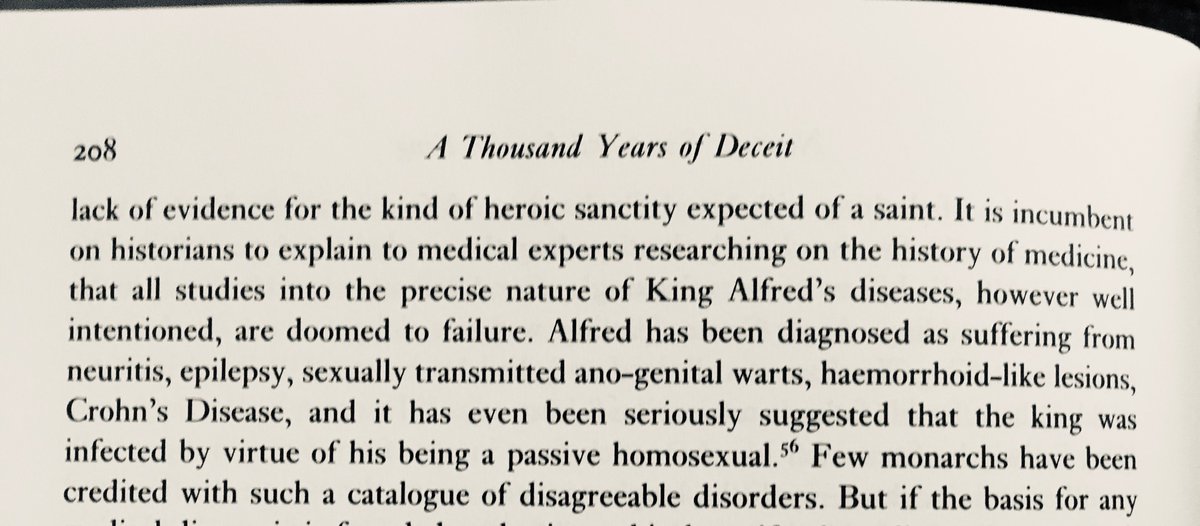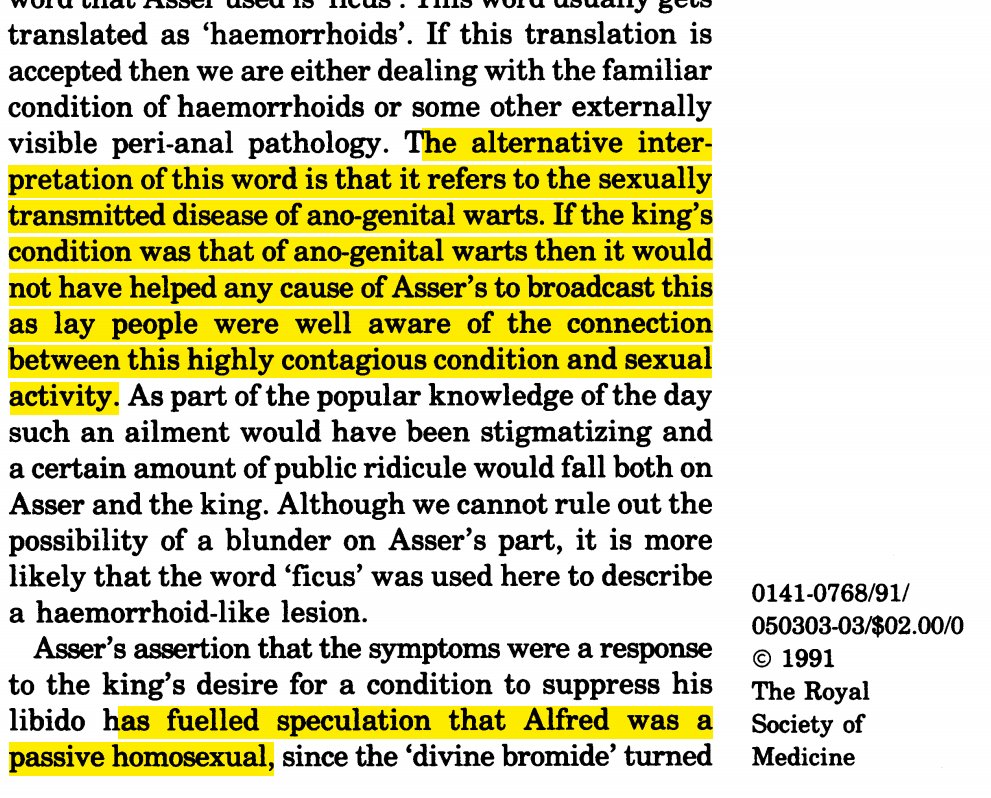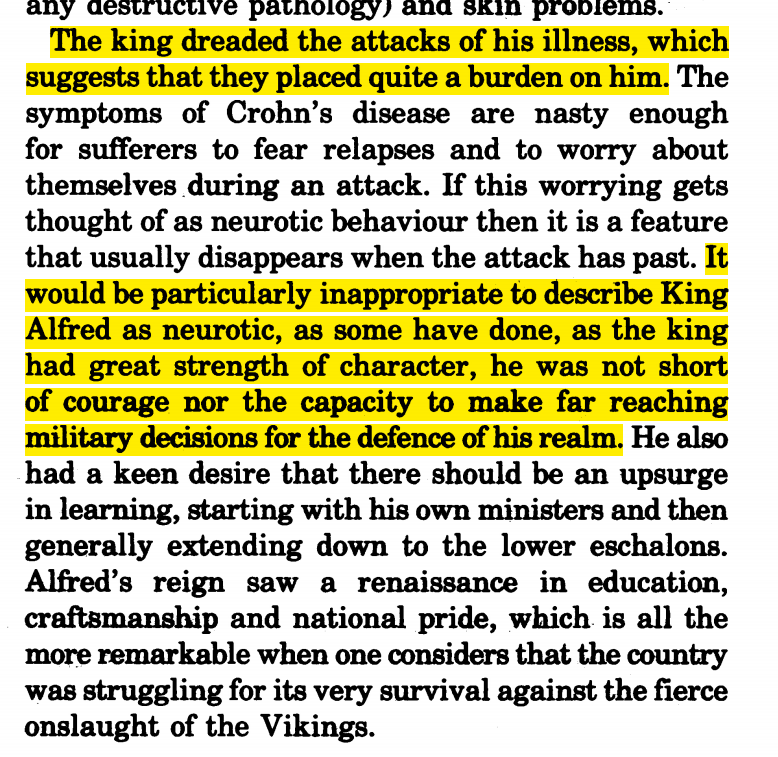Ugh, I can& #39;t believe I need to go down this road, but let& #39;s discuss a case study of how the Western idea of illness in leaders shifted from acceptable to a sign of weakness and effeminacy. Let& #39;s talk about King Alfred& #39;s hemorrhoids. #MedievalTwitter
King Alfred "the Great" was a ninth-century king who was the first king to claim rulership over all England, rather than part of it. He& #39;s beloved. He asked a man named Asser to write his biography while he was still alive. That bio emphasized Alfred& #39;s chronic illness.
Asser& #39;s biography claims quite clearly that Alfred was tormented by sexual desire as a young man and that he prayed to God for an illness that would help him resist it. God sent him "ficus" [figs], which are presumably hemorrhoids. That did the trick.
Eventually, Alfred asks for a different disease, and he is stricken with a new disease on his wedding night. We don& #39;t really know what the disease is, but he suffers with it for the rest of his life. Asser calls it one of Alfred& #39;s two tribulations, along with the Vikings.
This is all very hagiographical and martyr-like, setting up Alfred as the suffering saint-king.
Modern scholars HATE this story. HATE it. Why? Because they think suggests weakness that a king shouldn& #39;t have.
Modern scholars HATE this story. HATE it. Why? Because they think suggests weakness that a king shouldn& #39;t have.
There is a whole sea of scholarship dismissing the story as invented or even suggesting Asser& #39;s biography is a forgery because the illness story "doesn& #39;t seem credible."
Most of this is tied to two big ideas that these scholars repeat a lot:
1) that illness makes you weak and A Leader cannot possibly be ill and effective
2) illness--especially Alfred& #39;s--is kinda gay and that& #39;s also not something A Leader can be.
1) that illness makes you weak and A Leader cannot possibly be ill and effective
2) illness--especially Alfred& #39;s--is kinda gay and that& #39;s also not something A Leader can be.
This scholar is my favorite, because he cannot believe that a "macho warrior" could have a serious illness, and so all references to the illness must be forgeries. It is other people, claims the scholar, who are rightly read as a "wimp." Not Alfred.
This really comes to a head in G. Craig& #39;s article diagnosing Alfred as having Crohn& #39;s. She spends a LOT of time assuring us that Alfred couldn& #39;t have had an STD and that he wasn& #39;t a "passive homosexual," something nobody had claimed.
Craig argues that Alfred must not have feared the onslaught of his illness, despite Asser claiming so, because that would imply Alfred was "neurotic," something that a leader like Alfred couldn& #39;t be.
Craig argues that Asser& #39;s claim that Alfred suffered from his unknown illness constantly could not possibly be true, because Alfred led "a very full life."  https://abs.twimg.com/emoji/v2/... draggable="false" alt="🙄" title="Gesicht mit rollenden Augen" aria-label="Emoji: Gesicht mit rollenden Augen">
https://abs.twimg.com/emoji/v2/... draggable="false" alt="🙄" title="Gesicht mit rollenden Augen" aria-label="Emoji: Gesicht mit rollenden Augen">
This modern anxiety to "save" a historical leader from the connotations of a lifelong illness (associated in modernity with effeminacy, weakness, and fear) speaks to the layers of ableism built into modern narratives about (male) leadership. We are seeing that today with Trump.
I am not a disability scholar, I should note. If you& #39;re interested in more about disability and ableism in the Middle Ages, one great place to start is this open-access sourcebook from @punctum, edited by @cameronmcnabb (who you should follow!):
https://punctumbooks.com/titles/medieval-disability-sourcebook/">https://punctumbooks.com/titles/me...
https://punctumbooks.com/titles/medieval-disability-sourcebook/">https://punctumbooks.com/titles/me...
Other great medievalists to follow who work on disability include @DanielleGAllor @kosho22 @RickGodden @JonathanHsy @Transliterature @micah_goodrich

 Read on Twitter
Read on Twitter

![Asser& #39;s biography claims quite clearly that Alfred was tormented by sexual desire as a young man and that he prayed to God for an illness that would help him resist it. God sent him "ficus" [figs], which are presumably hemorrhoids. That did the trick. Asser& #39;s biography claims quite clearly that Alfred was tormented by sexual desire as a young man and that he prayed to God for an illness that would help him resist it. God sent him "ficus" [figs], which are presumably hemorrhoids. That did the trick.](https://pbs.twimg.com/media/Ejo9mLFWsAArVwv.png)





 " title="Craig argues that Asser& #39;s claim that Alfred suffered from his unknown illness constantly could not possibly be true, because Alfred led "a very full life." https://abs.twimg.com/emoji/v2/... draggable="false" alt="🙄" title="Gesicht mit rollenden Augen" aria-label="Emoji: Gesicht mit rollenden Augen">" class="img-responsive" style="max-width:100%;"/>
" title="Craig argues that Asser& #39;s claim that Alfred suffered from his unknown illness constantly could not possibly be true, because Alfred led "a very full life." https://abs.twimg.com/emoji/v2/... draggable="false" alt="🙄" title="Gesicht mit rollenden Augen" aria-label="Emoji: Gesicht mit rollenden Augen">" class="img-responsive" style="max-width:100%;"/>



